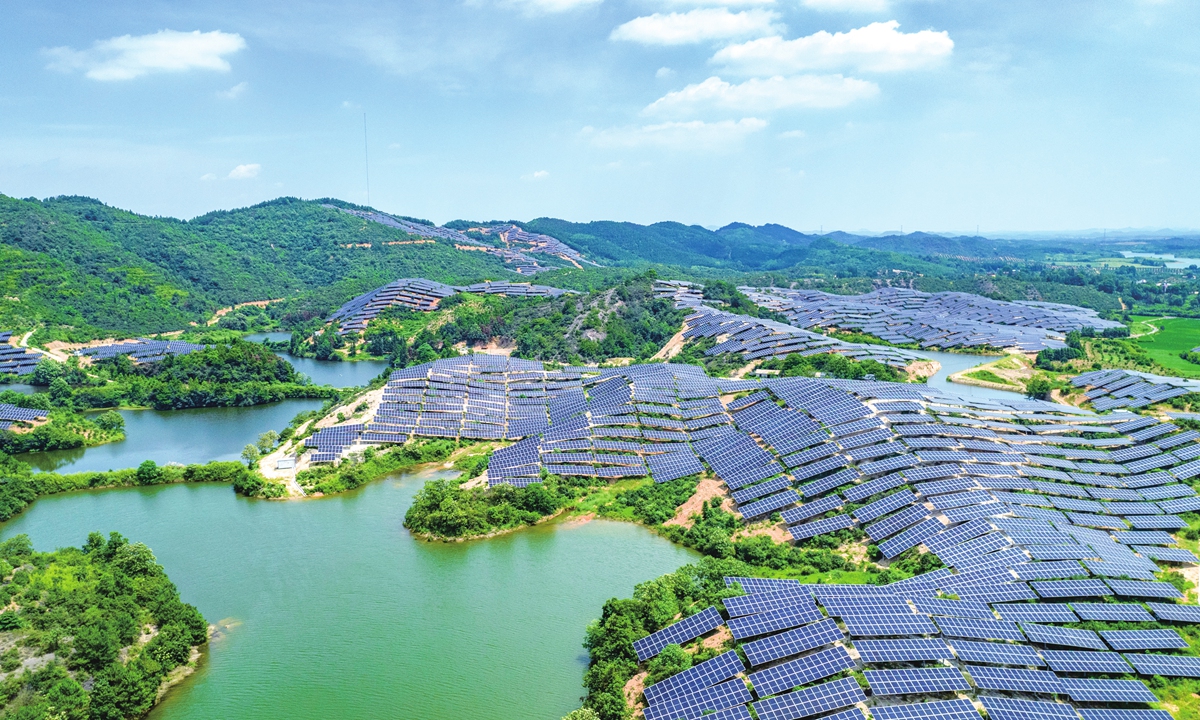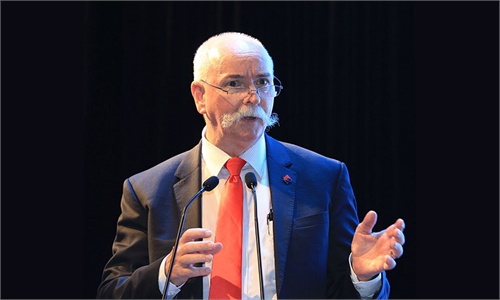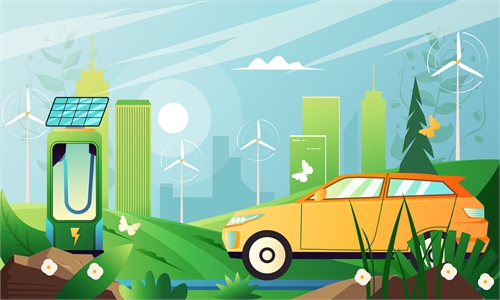Chinese new energy production capability responds to existing and future projected demand: Pakistani economist

A power station in Xinyu, East China's Jiangxi Province Photo: VCG
Editor's Note:China's "overcapacity" has become a "hot topic" in major Western media and for some officials, with the US using it as an excuse to impose tariffs. "The US considers China to be a threat to their lead and their hegemony in the field of new energy. And they are barring Chinese products and technologies from entering the US, which is unfortunate," Ishrat Husain (Husain), former chief economist of the World Bank and former governor of Pakistan's Central Bank, told Global Times (GT) reporter Su Yaxuan. The world needs both China and the US to work together and collaborate, rather than get into confrontations, he said.
GT: Recently, the West has been hyping up China's "overcapacity." In your opinion, does China really have "overcapacity" in new energy products?
Husain: No, I don't think so. We must realize that China has been world's factory as it contributes 35 percent of global manufactured goods, which is more than the combined total of goods produced by the US, Japan, Germany, India and South Korea. China has held the position of the top manufacturing country for more than 10 years and has consistently enjoyed a trade surplus of around 10 percent of GDP by importing less than it exports to the rest of the world.
China has not only invested in emerging technologies and built supporting infrastructure such as highways, airports, bullet trains, ports, which along with low wages have reduced the unit cost of production, it has also anticipated the future demand that is becoming evident due to climate change. The demand for new energy products is also rising in developing countries, which is beneficial for the economic prosperity of these countries.
Climate change is one of the challenges currently facing the world. We have to go for electric vehicles (EVs), batteries, clean energy such as solar and wind as well as green technology. China is on the right track by moving in these directions. By moving forward in these areas, China has already established itself as the leader, in solar panels, batteries and production of EVs. And China is spending a lot of money on new and emerging technologies.
GT: How should we understand "overcapacity" from an economic perspective?
Husain: Overcapacity means that you are selling your goods below the production cost. But that is not what China is doing. It is producing goods based on its comparative advantage, utilizing economies of scale, top scientific manpower and world-class infrastructure. China is meeting current and future demand, both domestically and internationally, especially in emerging and developing countries, at competitive prices. In other words, China is producing those goods in response to existing and future projected demand based on its comparative advantage. This is not overcapacity.
GT: Do developing countries, especially those in the Global South, acknowledge China's "overcapacity"?
Husain: The developing countries, especially those in the Global South, do not believe that China has "overcapacity" in its energy products. This is because the new energy products being supplied are driven by demand, both current and projected for the future. China is simply trying to meet this demand and there does not appear to be any oversupply. China has developed expertise in the entire supply chain, from design to final assembly, using low-value components and parts from other countries. As a result, its energy industry is able to produce low-cost, efficient, and high-quality products.
Furthermore, other developing countries are benefiting from China's new energy sales. For example, Pakistan, Bangladesh, Sri Lanka and African countries are switching from fossil fuels to clean, renewable energy. China has a large production capacity for solar panels, and the export prices are relatively low, which benefits countries like ours that import them. Therefore, some developing countries, like Pakistan, are now benefiting from lower prices for solar panels. A lot of people in Pakistan are now switching their rooftops to solar panels.
This is a win-win situation.
GT: What is the real purpose of the US playing the "overcapacity" card?
Husain: The US considers China to be a threat to their lead and hegemony in the field of new energy. They are providing subsidies and protecting their own industries while barring Chinese products and technologies from entering the US, which is unfortunate. Just like in the semiconductor and chip sector, the Joe Biden administration has provided substantial subsidies to their own semiconductor and chip factories while imposing restrictions on China. They do not want Chinese products to enter the US market. These actions go against the philosophy of their economic model as the consumers have to bear the brunt of higher prices and inflationary pressures.
The world, particularly the developing countries, needs both China and the US to work together and collaborate, rather than get into confrontations. I don't believe that we should have two blocs, one led by China and the other by the US. Both of these countries have something to offer for the stability and prosperity of the world.
GT: What do you want to say about the current development of new energy in China?
Husain: I am optimistic about China's future because of the new quality productive forces, and the lead China is taking in green energy.
China should continue to invest in research and development. China has good-quality scientific manpower and should continue to encourage scientists to come up with innovations, new products and new processes from which the rest of the world can benefit.
GT: You have denied the claim that China extracts resources from other developing countries. You believe that, unlike the West, China always asks the countries it helps what they truly need. In your view, how does China help and cooperate with other developing countries, such as Pakistan? Is there a "debt trap" as Western media claims?
Husain: I think it is now very clear that China is a big aid provider to African countries, and it responds to the needs of the countries. It doesn't come with the preconceived notion that this is what your country should do. It comes with the proposition: What are your priorities? And we will try to help you with the priorities. Whether it is a railroad, a highway, or a motorway, an energy plant, China helps those countries in meeting their priorities.
Until today, China has invested $25.4 billion in generating more than 8,000 megawatts of electricity in Pakistan. Most of it is hydropower, or electricity, which is clean energy. And they are going to compete for three more projects in the near future. So China has actually responded to our pressing needs as we are facing power outages hurting our industry and inconveniencing our households. China has come to our rescue, and I'm glad that it actually executes these projects.
One of the good things about China is that its speed in executing competing projects is very high as compared to Pakistan.
I don't think China's help is a debt trap. It was exaggerated by the Western media because they don't want the developing countries to be aligned with China in their development processes and because the West thinks they are losing their grip.


